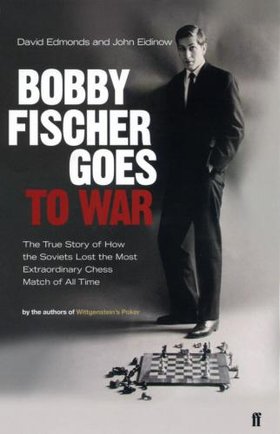
Bobby Fischer Goes to War
How the Soviets Lost the Most Extraordinary Chess Match of All Time
کتاب های مرتبط
- اطلاعات
- نقد و بررسی
- دیدگاه کاربران
نقد و بررسی

Starred review from December 8, 2003
The duo that crafted the bestselling Wittgenstein's Poker
returns to chronicle "the most notorious chess duel in history," the 1972 match between world champion Boris Spassky and challenger Bobby Fischer. Although the competition has achieved iconic status, Edmonds and Eidinow do an excellent job of making the story fresh, recreating the atmosphere of controversy that surrounded both players long before they met in Reykjavik, not to mention the extraordinary hurdles tournament organizers faced in getting the already eccentric Fischer to even show up, which ultimately required a phone call from Henry Kissinger and prize money put up by an English millionaire. Fischer's troubling personality is a matter of common knowledge, but the thawing of the Cold War enables the authors to flesh out the Soviet side of the story, offering a fuller perspective on the friction between the rebellious grandmaster and Communist officials, and revelations about the very active presence of the KGB during the games, while debunking other rumors about plots to poison or brainwash Spassky. (Declassified FBI files also present groundbreaking information about Fischer and his family.) The actual chess has been analyzed to death elsewhere, so the authors don't delve into the games' details much except when the players made horrendous blunders, which segue into the underlying focus on psychology, addressing Fischer's ability to get away with bullying officials into meeting his exacting demands and Spassky's loss of confidence over the course of the match. Even if you think you know the story, this highly entertaining account will surprise and delight. (Mar.)
Forecast:
With a large marketing campaign and an eight-city author tour, this book will likely experience the same success as
Wittgenstein's Poker.

May 3, 2004
Tsoutsouvas turns in a steady, suitably understated performance of this eminently engrossing account of the 1972 world championship chess match between the eccentric American challenger Bobby Fischer and the then-reigning Soviet title holder Boris Spassky. Edmonds and Eidinow (Wittgenstein's Poker
) explore not only the widely variant backgrounds of each of the players, but also the nuances of the Cold War societies that produced them. The political wrangling on both sides—coupled with Fischer's outrageous, often petulant demands—turn what might have been a humdrum tale of logistics and chess analysis into a vibrant carnival of human stubbornness, ego and, occasionally, brilliance. Tsoutsouvas reads in a level, largely unembellished style, but his approach suits this sober text. And while characterization is not a highlight of the reading, Tsoutsouvas, with his natural baritone, can't resist a pass at some of the Russian accents or the voice of Henry Kissinger, which he does admirably. It all makes for a fitting rendition of this intriguing take on the forbearance and political gamesmanship it took to get two grown men to sit down across a table from one another and play a game. Simultaneous release with the Ecco hardcover (Forecasts, Dec. 8, 2003).

























دیدگاه کاربران